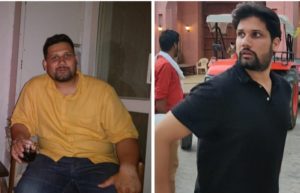A healthy society is better equipped to deal with the pandemic. Obesity makes matters worse. Intermittent fasting is a way out if done properly, it’s not just another fad!
Doctors in Delhi are witnessing a trend. There’s a link between obesity and Covid-19 related complications. Dr Rashid Gouri, a senior resident at AIIMS, confirmed in an interview that “Out of every 10 Covid patients I treat, 5 to 6 people suffer from obesity” and she felt the urgent need to understand the connection between obesity and Covid-19.
Many Delhites working from home, took this break from going to the office as an opportunity to make amends in their lifestyles and concentrate on their health. Many took to cycling, jogging and yoga. In the mornings, before the onset of winters many were seen cycling around, sometimes the whole family, in the broad streets of Lutyens Delhi.
Though fasting has been an age-old thing in Indian culture, often linked to religious beliefs, intermittent fasting captured the imagination of the health freaks and those trying to lose weight. It has an advantage, it can be employed by all age groups as doesn’t involve sweating out for hours, also doesn’t have the kind of psychological barrier, as fasting has been a part of our ethos.
Intermittent fasting has many names like the intermittent energy restriction, which essentially involves skipping meals alternating voluntary fasting and non-fasting over a given period could be alternate-day fasting, periodic fasting or daily time-restricted feeding. There are many ways of doing it like the 16/8 method—where you eat only in an 8-hour window every day and for the rest of the day you’re allowed to have water. The other variants being the 5:2 diet; Eat Stop Eat; Alternate-day fasting or the warrior diet—where you survive on the bare minimum as if caught up in some situation like marooned on an island with little to eat, or spontaneous meal skipping.
Some health experts worry that it has become another fad, and if done improperly may damage the health rather than benefiting, or could turn out to be a very unhealthy way of losing weight.
Though, there are some success stories. For they did so being acutely aware of their body needs. “I listen to my body. It gives clear signals,” says Harry Gill, 37 years of age, lives between Chandigarh and Delhi—has a flat in Noida. He was 130 kilograms when he started intermittent fasting. He has been doing it for more than two years now, losing 35 kilograms, reducing his waistline from 44 to 34 inches. His face glows with health, he doesn’t feel starved, drastic loss of weight—though has been gradual—hasn’t left him with saggy fat around his belly. All his health parameters have improved, he’s a healthy man. He had a breathing problem, cholesterol, “all of it has vanished,” he says.
A gregarious man, Harry, an entrepreneur, wants to share the benefits of his experience. He looks at it as a lifestyle change, and he has no fixed fasting window, usually hovers around 14 to 16 hours, usually has early lunch and dinner. And these meals are fairly elaborate and balanced. He starts with fruits, which are the easiest to digest. He’s a foody and doesn’t think twice before having butter chicken, he is also fond of alcoholic beverages. There are times when he opens his fast with chilled beer. His job is such that it entails one meal a day outside the house.

There are certain vegetarian and non-vegetarian foods that are harmful, so be aware–Harry warns. He listens to his body which gives him clear signals, he eats when he feels hungry and as long as he feels hungry. So he has no fixed duration of fasting. “There have been instances when I have fasted for 3 or 2 days at one go, and was only on water, and was feeling very good. I can do it longer but the family gets worried,” he says with a smile. He makes it very clear that even during these long spells of fasting he felt neither hungry, weak, or giddy or had to make a special effort not to eat. It all happens very seamlessly. But then there are days when he’d have all three meals.
He explains in detail how a healthy body is a hydrated body…and recommends sipping water regularly. Never should the body be stressed—both by overindulgence or fasting. He doesn’t avoid food that he likes when he eats it—“don’t count your calories,” is his advice.
Neha Kapoor, 30, has lost ten kilograms by intermittent fasting in the last 6 months. She has entered a routine, “I skip breakfast, have my first meal around 2 pm and the second at 9 pm.” It has done her wonders, she’s lost weight, her energy levels are high, and the amount of time she’s spent sweating out in a gymnasium has reduced. Or in her words, “I’m stronger, leaner and enthusiastic.” She’s a pink picture of health and wants her husband, Yash Narayan, to join the fun, “I encourage my chubby hubby to start the practice of intermittent fasting during our evening walks.”

There are many who were not so successful and think of it as another wasted attempt to reduce their bulging waistline. And there’s a reason for it. “Intermittent fasting is not for everyone,” explains Luke Coutinho, a famous health and lifestyle coach, introduces himself as “an integrative and Lifestyle Medicine. (I’m) self made (man), natural and imperfect. I block all toxicity, I choose to, lifestyle is a powerful drug – use it.”
He explains that intermittent fasting is “not a wildcard to lose weight” and can result in more health damage than benefits if not done properly. He talks about the rhythm and recommends following a routine. He agrees with Harry “listen to your body.” A nutritious diet is a must during your eating window, break your fast with lime water and not cupcakes, only water is allowed during fasting, coffee is a big no will add to acidity—it’s an addiction not fasting and will prevent “you from experiencing “the cellular energy high.” “It’s not a punishment (for being fat),” says Luke and it’s easy to know if it’s working or not—skin glows, you experience more energy along with a feeling of wellness.
The lesson to learn: a healthy society is better equipped to deal with the pandemic.





